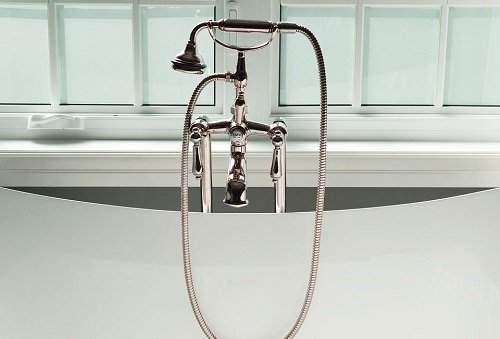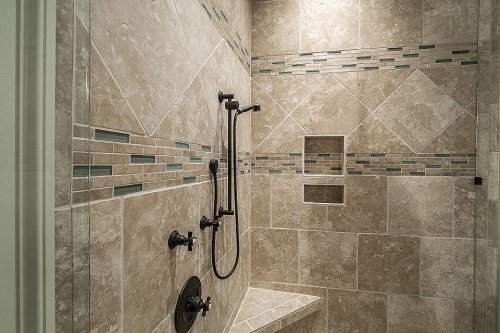Most homeowners consider toilet bowl cleaner a viable option for cleaning their shower. Well, they couldn’t be more misguided. Even though toilet cleaners are highly effective in removing stains from ceramic toilet bowls, they are not apt for cleaning showers. You should know that most showers’ relatively large surface area makes toilet cleaner ineffective in cleaning them. Also, the active ingredients in toilet cleaner are toxic and corrosive. Using natural cleaning solution to clean your shower is much safer. But can you can use toilet bowl cleaner in the shower? Read on to know the details and whether or not it’s safe for you and your shower fixtures.
Can You Use Toilet Bowl Cleaner in the Shower?
Using toilet cleaner to sanitize and remove stains from your shower is not the best idea. Toilet cleaners have corrosive properties that can damage shower surfaces. Additionally, toilet cleaners emit hazardous fumes that pose a health risk to humans.
It would be best if you only used toilet bowl cleaners as a last resort in cleaning your shower. Remember to wear protective gloves and rinse your shower thoroughly after using toilet cleaner on it. Toilet cleaner also attacks chrome-plated shower surfaces if left for too long. Therefore, you should rinse the shower surfaces as quickly as possible and ensure your bathroom is well ventilated.
What Are Toilet Cleaners, And How Do They Work?
Toilet cleaners help remove stains, oils, and dirt from toilet bowl surfaces. It is worth noting that the active ingredients in toilet cleaner prevent the discoloration of white commodes. Even though some toilet cleaners are EPA-approved, using them to clean shower surfaces is not the best idea.
The hydrochloric acid contained in toilet cleaner works by disintegrating dirt molecules. Bleach works by breaking down unwanted colors, enabling your toilet to achieve its original white appearance.
Most toilet cleaners available in the market are in a liquid state. Toilet cleaning brands have varying levels of strength and concentration. Low and medium-concentration toilet cleaners are ideal for removing stains from bathtubs, toilet bowls, and sinks, while high-concentration toilet cleaners are apt for attacking stubborn grime such as rusted metal surfaces.

The active ingredients in toilet cleaners have harmful effects on shower surfaces. Additionally, you should use protective gear when handling high-concentration toilet cleaners. Here are the primary active ingredients in toilet cleaners:
1. Hydrochloric Acid
Hydrochloric acid can react with shower surfaces and ruin their texture and appearance. It is worth noting that porcelain surfaces such as toilet bowls are immune to the corrosive effects of hydrochloric acid. However, chrome-plated shower surfaces can get damaged when they contact hydrochloric acid. Bathtubs made of carbon fiber and plastic materials are also susceptible to the corrosive effects of acids.
You should exercise great care when handling toilet cleaners since the corrosive properties of hydrochloric acid can burn and irritate the skin. The acid also emits hazardous fumes that pose a health risk to humans and animals. Always ensure that your bathroom is well-ventilated when deploying toilet cleaner.
2. Bleach
Bleach is an active ingredient found in most commercial toilet cleaners. The chemical poses a health hazard to humans and pets in your household. It also causes skin irritation when it comes into contact with the skin.
Bleach can also affect the normal functioning of the respiratory system when inhaled. It is thus advisable to open the door and window in your bathroom when using toilet cleaners. Working with bleach for long periods can cause one to develop severe conditions such as cancer.
On the upside, the bleach in toilet cleaner curtails discoloration on shower surfaces. Bleach whitens and exterminates pathogens on toilet bowl surfaces. Regularly using bleach on your toilet prevents the transmission of diseases causing pathogens from one toilet user to the other.
Like acidic solutions, bleach can damage shower surfaces. When you want to purchase a cleaner for cleaning your shower, always look for one with a relatively low bleach concentration. However, porcelain toilet bowls are largely immune to the corrosive effects of high bleach concentrations.
Can Toilet Cleaners Damage Bathtubs and Showers?
Using toilet cleaner on your bathtub can ruin it over time. This is because bathtubs lack protective ceramic surfaces. Effective utilization of a toilet cleaner requires you to leave it for approximately 15 minutes on the bathtub surface. This is enough time for the active ingredients in the cleaner to oxidize the bathtub surface.
When using toilet cleaner as a last resort to remove stains from your bathtub, leaving it for less than ten minutes is advisable. Doing so allows you to optimize its cleaning capabilities while minimizing its harmful effects. Remember to rinse off the bathtub thoroughly to eliminate any residues that may eat away its surface after cleaning.
Can Toilet Cleaner Cause Death?
If you have handled toilet cleaner before, you have probably wondered if it can kill you. Well, the simple answer is yes. Toilet cleaner can cause death when ingested directly. Also, a toilet cleaner can kill you if you inhale significant amounts of toxic fumes. The active ingredients in toilet cleaner are harmful to the body in a liquid or gaseous state. When bleach comes into contact with other surfaces, it can react and form other harmful byproducts.
Cleaning your shower requires you to use higher amounts of toilet cleaner than you usually use to clean your toilet bowl. This exposes you to a higher concentration of toxic fumes. It is advisable to open the door and window, run the fan, and wear gloves. You can also wear a gas mask if you have it at your disposal.

Viable Alternatives for Cleaning Your Shower
Now that we have established that toilet cleaner is not a viable option for cleaning your shower, it is important to consider alternatives. The ideal cleaning agent for your shower is contingent upon the specific shower surfaces you intend to clean. Most people reckon that it is okay to use toilet cleaner on all shower faces. However, they could not be more wrong.
It would be best to restrict toilet cleaners to cleaning your toilet bowl only. Here are the alternatives you should consider when cleaning your shower:
1. Lemon Balm
Lemon balm is highly effective in removing stains from shower surfaces. It is also an affordable option because you can plant lemon balm outside your house. All you have to do is pluck its leaves and use them to scrub shower surfaces. It is worth noting that the leaves have antibacterial properties. Using lemon balm makes it safer and healthier for guests to use your shower.
2. Vinegar-Baking Soda Mixture
You can never go wrong with a vinegar-baking soda mixture. It is worth noting that vinegar has a deodorizing effect that helps fight foul odors in your shower. The vinegar-baking soda mixture also has mild effects on shower surfaces. It is advisable to remove stains from your shower using the mixture every seven days.
Here are the steps you should follow in preparing and using the vinegar-baking soda mixture:
- Mix one part baking soda and two parts white vinegar in an empty discarded can.
- Use a sponge to spread the mixture on the shower surfaces you intend to clean.
- Scrub the shower surface as you apply the mixture.
- Leave the shower surfaces undisturbed for approximately five minutes.
- Rinse off the shower surfaces thoroughly and leave them to dry.
- Repeat the procedure on other surfaces such as commodes, showers, faucets, sinks, and countertops. Remember to clean hard-to-reach areas of your shower.
You can use the vinegar-baking soda mixture in paste form to remove stains from hard-to-reach areas. All you have to do is stir the mixture until you achieve a uniform paste.
3. All-Purpose Home Cleaners
All-purpose home cleaners are feasible alternatives for sanitizing and removing stains from your shower. It would be best to use an extendable scrubber to apply and scrub shower surfaces. Acid-free home cleaners are ideal for eliminating grout lines in hard-to-reach shower surfaces.
It is advisable to clean hard-to-reach shower surfaces every seven days. After applying acid-free home cleaner on the grout line, you should leave it for roughly 15 minutes for maximum effect. Finish by rinsing it thoroughly with pristine water.
4. Baking Soda-Hydrogen Peroxide Mixture
A baking soda-hydrogen peroxide is highly effective in removing stains from shower surfaces. Hydrogen peroxide has antibacterial properties that minimize the risk of contracting diseases in your shower. Here are the steps you should follow in preparing and using the mixture:
- Mix two cups of baking soda and one cup of hydrogen peroxide in an empty can.
- Apply the mixture onto the shower surface you intend to clean.
- Use a sponge to scrub the surface and leave it undisturbed for roughly 45 minutes.
- Rinse off the surface with pristine water.
Bottom Line
Overall, employing toilet bowl cleaner in the shower is not a good idea. You must know that toilet bowl cleaner poses a health hazard to humans and pets. Additionally, the active ingredients in toilet cleaner have corrosive properties that can damage shower surfaces over time. Always consider using alternatives such as all-purpose home cleaners to sanitize and remove stains from your shower surfaces.
